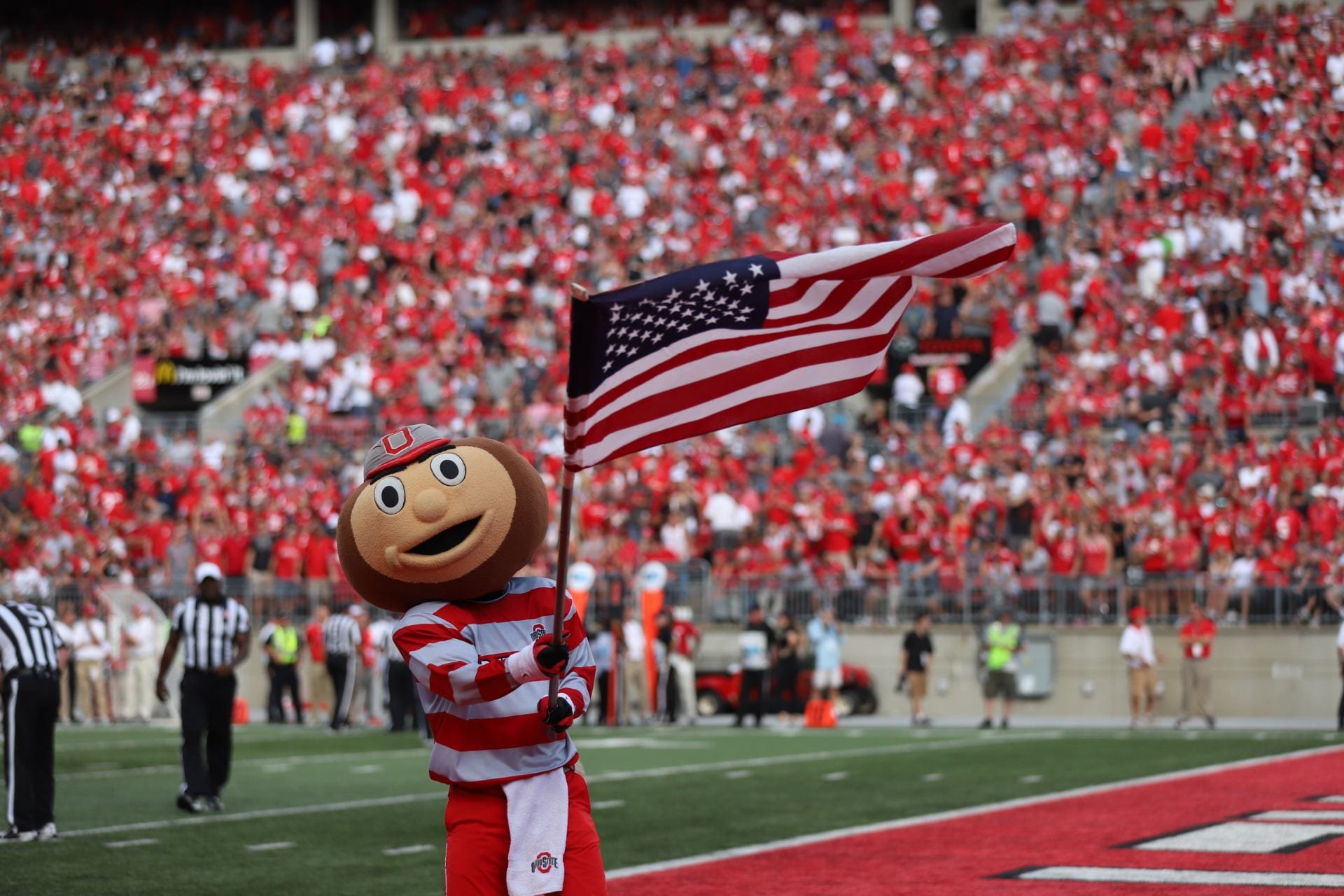
Brutus Buckeye waves the American Flag after a touchdown during the second quarter of the game against Indiana on Oct. 6, 2018. Ohio State won 49-26. Credit: Amal Saeed | Lantern File Photo
Americans may be influenced by politics or their racial identity when it comes to controversial issues in sports, a recent study suggests.
In a study published June 28, researchers found a distinct separation in beliefs along political and racial lines on participants’ opinions on whether college athletes should be paid and if athletes protesting during the national anthem is acceptable, Chris Knoester, associate professor of sociology at Ohio State and co-author of the study, said.
“What we’re finding is that essentially having the experience of being white and identifying as being white in America seems to encourage people to see the world in a vastly different way than people who are not white in America,” Knoester said.
According to the study, 69 percent of white adults surveyed opposed college athletes receiving payment and 73 percent were against forms of protest during the national anthem. Black adults were more likely to be in support of both issues, with 29 percent opposed to payment and 32 percent against protest rights.
Latino adults and other people of color were more likely to support athletes’ rights in these situations, though not as supportive as Black adults, Knoester said.
Rachel Allison, associate professor of sociology at Mississippi State University and co-author of the study, said people who opposed athletes’ right to protest during the national anthem tended to view the action as an issue of patriotism.
“It’s about the nature of what patriotism is — one definition of patriotism is of unquestioning adherence to authority, of following the traditions that surround the flag or the national anthem unquestioningly,” Allison said.
Allison said this definition of patriotism is opposite of another frame others take, in which patriotism is viewed as challenging the status quo and asking that the country change its practices for the better. She said people who view patriotism from this frame recognize racial injustice as a deep issue.
The study used data from the online Taking America’s Pulse 2016 Class Survey, a survey distributed before the 2016 U.S. Presidential election that measured who Americans planned to vote for and their views on certain issues.
The study builds on the survey and brings the issues of protesting in sports during the national anthem and paying college athletes to the forefront because they are of particular relevance to Black athletes, Allison said.
“They’re also issues that in public discussion have been overly racialized — politics have become a part of public discussion on these issues,” Allison said. “In an era of really stark political polarization and division, it makes them really appropriate to analyze.”
Knoester said the study applies critical race theory — a theory that examines U.S. history from a lens that recognizes systemic racism as a part of American society, according to Columbia University. The theory applied to how people viewed controversial issues in sports, he said.
“Disproportionately, people who are white think fondly about history and have nostalgia for the past oftentimes,” Knoester said. “When thinking about today, they don’t think that racial or ethnic inequalities or a lot of other things are particularly pronounced and problematic.”
Allison said with recent policy changes allowing college athletes to profit from their name, image and likeness, more people may change their opinion to favor athletes’ rights.
“We have seen change over time in overall public sentiment towards greater support for athletes’ rights and across many of these issues, so more support than not more recently for athletes to receive compensation at the collegiate level, for the accessibility of protests — I think these go hand-in-hand to some extent,” Allison said. “Part of the reason that we saw changes to name, image, likeness at the collegiate level was because of swelling public support.”


